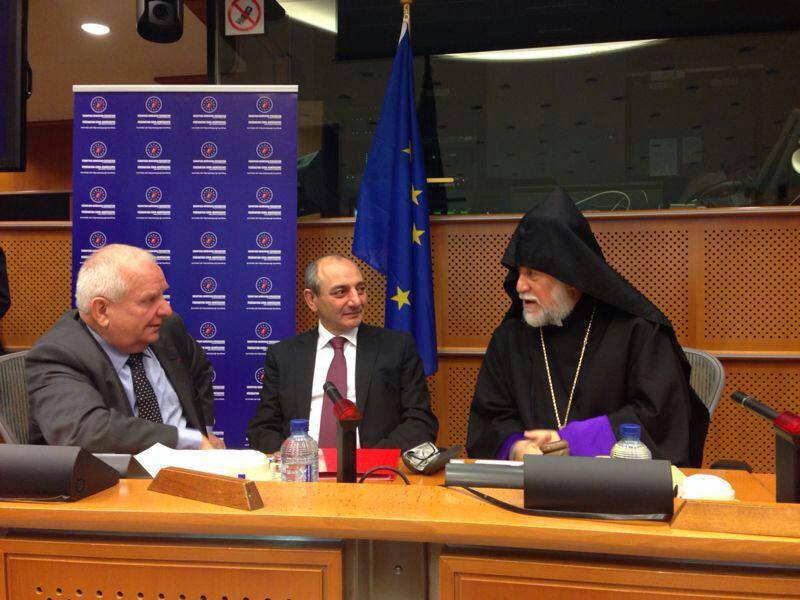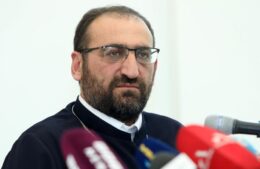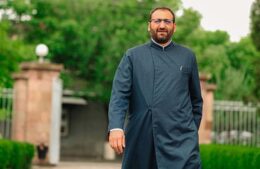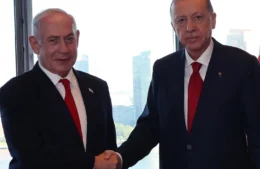Turkey Must Return Armenian Churches, Aram I Says in Europe
- (0)

His Holiness Aram I (right) with President Bako Sahakyan (center) ahead of his speech at the European Parliament in Brussels
BRUSSELS—In his opening remarks at the 3rd Conference of European Armenians, organized by the European Armenian Federation for Justice and Democracy (ANC of Europe) and held at the European Parliament, His Holiness Aram I urged Turkey to “return Armenian churches to their legitimate owners, the Armenian people.”
Speaking about the Armenian people’s struggle for justice, he said that “Numerous studies, publications, lectures, seminars and conferences, substantiated by historical evidence and eye witness accounts, have for decades given concrete articulation to the Armenian people’s struggle for the recognition of the Armenian Genocide. Contacts with political circles and collaboration with actors of civil society has further helped in awareness building with respect to the Armenian Genocide. This first genocide of the 20th Century has become now an integral part of the international agenda”.
Referring to the emerging realities, Aram I reminded that “The question of the Armenian Genocide is acquiring a new form and expression; it is generating a renewed interest and a new reaction. These factors and developments, referred to briefly, with their implications need to be taken into serious consideration as we try to reassess and reactivate our efforts. However, we must be realistic. We must bear in mind that activism may soon reach a dead-end if it is not consonant with the geopolitical realities and interests of the present world; scholarly research will be confined to academic circles if it is not tested by international law; and international law will be inapplicable if it is not supported by political will.”
His Holiness stressed the need for a “new strategy, a new entry point and a new emphasis in order to avoid stagnation and embark on a new process.” He said that “we have spent a great deal of time, energy and capital on activism and historical research. Without undermining the vital importance of these efforts, it is time that we focus our attention on reparation. The Antelias Conference, organized by the Armenian Catholicosate of Cilicia, was precisely a tangible step along these lines. It spelled out those provisions and entry points that international law may provide in the direction of reparation. At the same time, it highlighted limitations, ambiguities and uncertainties within the existing international law”.
According to Catholicos Aram I “accepting truth and compensating victims of genocide as part of a healing and reconciliation process are not merely legal matters pertaining to judicial mechanisms and procedures; they represent a moral imperative which is at the heart of human rights, and as such must be recognized, respected and implemented by nations and states under all circumstances. If our approach is conditioned exclusively by geopolitical considerations, if our criteria in tackling these matters are strictly determined by international law, then ethical values and moral standards, as well as fundamental principles of human rights, will be absent from international relations. Some might say that this is already the case…”
Speaking about the Armenian Church properties His Holiness reminded that they “cannot be considered ‘abandoned’ because the Armenians did not leave their properties by their own choice; they were threatened and forced to leave them. Hence, the Armenian properties were seized by force and confiscated by state. Confiscation of properties under all circumstances is not only illegal, but is also a crime against humanity. The Armenian people are the legitimate owners of their properties”.
Concluding his remarks Aram I said “Our claim is legitimate. And one cannot ignore its moral, ethical and religious dimensions and implications. Turkey must be courageous to accept the truth, if it is really committed to human rights, if it believes in harmonious coexistence, meaningful dialogue and close collaboration among nations, states and religions; it must take a concrete step in the direction of reparation by returning the churches to their rightful owners, the Armenian people. This is, indeed, high time for Turkey to act, instead of reacting, by changing its policy of denial, negativism and obstructionism to that of reconciling with its past.”


















